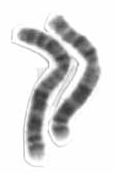2p15-16.1 microdeletion syndrome
| 2p15-16.1 microdeletion syndrome | |
|---|---|

| |
| Synonyms | |
| Pronounce | |
| Specialty | Medical genetics |
| Symptoms | Intellectual disability, developmental delay, microcephaly, dysmorphic features |
| Complications | N/A |
| Onset | Congenital |
| Duration | Lifelong |
| Types | |
| Causes | Genetic mutation |
| Risks | |
| Diagnosis | Genetic testing, chromosomal microarray analysis |
| Differential diagnosis | Other chromosomal deletion syndromes |
| Prevention | |
| Treatment | Supportive care, therapies for developmental delay |
| Medication | |
| Prognosis | Variable |
| Frequency | Rare |
| Deaths | |
2p15-16.1 microdeletion syndrome is a rare genetic disorder caused by a deletion of a small segment of chromosome 2. This condition is characterized by a variety of clinical features, which can include developmental delay, intellectual disability, and distinctive facial features.
Genetic Basis[edit | edit source]
The syndrome is caused by a microdeletion on the short arm of chromosome 2, specifically in the region designated as 2p15-16.1. This deletion results in the loss of several genes, which are believed to contribute to the clinical manifestations of the syndrome. The exact size of the deletion can vary among affected individuals, leading to a range of phenotypic expressions.
Clinical Features[edit | edit source]
Individuals with 2p15-16.1 microdeletion syndrome often present with:
- Developmental delay
- Intellectual disability
- Distinctive facial features such as a broad forehead, hypertelorism (wide-set eyes), and a short nose
- Microcephaly (small head size)
- Hypotonia (reduced muscle tone)
Diagnosis[edit | edit source]
Diagnosis of 2p15-16.1 microdeletion syndrome is typically made through genetic testing, such as chromosomal microarray analysis or fluorescence in situ hybridization (FISH), which can detect the specific deletion on chromosome 2.
Management[edit | edit source]
There is no cure for 2p15-16.1 microdeletion syndrome, and treatment is focused on managing the symptoms and providing supportive care. This may include:
- Early intervention programs for developmental delays
- Special education services
- Physical and occupational therapy
- Regular monitoring by a team of specialists
Related pages[edit | edit source]
Search WikiMD
Ad.Tired of being Overweight? Try W8MD's physician weight loss program.
Semaglutide (Ozempic / Wegovy and Tirzepatide (Mounjaro / Zepbound) available.
Advertise on WikiMD
|
WikiMD's Wellness Encyclopedia |
| Let Food Be Thy Medicine Medicine Thy Food - Hippocrates |
Translate this page: - East Asian
中文,
日本,
한국어,
South Asian
हिन्दी,
தமிழ்,
తెలుగు,
Urdu,
ಕನ್ನಡ,
Southeast Asian
Indonesian,
Vietnamese,
Thai,
မြန်မာဘာသာ,
বাংলা
European
español,
Deutsch,
français,
Greek,
português do Brasil,
polski,
română,
русский,
Nederlands,
norsk,
svenska,
suomi,
Italian
Middle Eastern & African
عربى,
Turkish,
Persian,
Hebrew,
Afrikaans,
isiZulu,
Kiswahili,
Other
Bulgarian,
Hungarian,
Czech,
Swedish,
മലയാളം,
मराठी,
ਪੰਜਾਬੀ,
ગુજરાતી,
Portuguese,
Ukrainian
Medical Disclaimer: WikiMD is not a substitute for professional medical advice. The information on WikiMD is provided as an information resource only, may be incorrect, outdated or misleading, and is not to be used or relied on for any diagnostic or treatment purposes. Please consult your health care provider before making any healthcare decisions or for guidance about a specific medical condition. WikiMD expressly disclaims responsibility, and shall have no liability, for any damages, loss, injury, or liability whatsoever suffered as a result of your reliance on the information contained in this site. By visiting this site you agree to the foregoing terms and conditions, which may from time to time be changed or supplemented by WikiMD. If you do not agree to the foregoing terms and conditions, you should not enter or use this site. See full disclaimer.
Credits:Most images are courtesy of Wikimedia commons, and templates, categories Wikipedia, licensed under CC BY SA or similar.
Contributors: Prab R. Tumpati, MD

